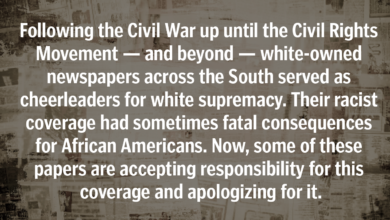Arkansas legislator says ending ‘state-sponsored discrimination’ is aim of his bill • Arkansas Advocate

Legislation that criminalizes government affirmative action programs in Arkansas heads to the full Senate after a panel approved it Tuesday.
Senate Bill 71 by Republican Sen. Dan Sullivan of Jonesboro would do away with programs that encourage state agencies, public schools and colleges to hire people of color and women.
The bill would make it a misdemeanor for anyone to “negligently violate” its provisions. It prohibits state and local government agencies, including schools and universities, from taking into consideration race, sex, color, ethnicity or national origin in employment, public education and procurement matters.
“We will not ever end discrimination with more discrimination,” Sullivan told the Senate State Agencies and Governmental Affairs Committee. “At some point, the state will put that flag in the ground and say, ‘We will not support racial discrimination anymore.”
Sen. Clarke Tucker (D-Little Rock) said the legislation “does a whole lot more than that.”
He cited the Mosaic Templars Cultural Center, a museum dedicated to Black history and culture in downtown Little Rock, as an example of an entity that would be affected by the bill.

“It may not be your intent to shut this museum down, but that’s effectively what would happen if this bill passes. This bill as written would make their conduct illegal. They’re showing preference based on race; it’s what they do. Is it your intent not to eliminate that?”
Sullivan responded that the goal of the bill is to end “state-sponsored discrimination.”
Some lives will be improved and others will be hurt as a result of SB 71, he said.
“That’s what happens when we make big decisions,” Sullivan said.
Tucker asked Sullivan, “Is it OK with you that the Mosaic Templars Cultural Center will effectively cease to exist if this bill passes?”
“You’re describing only one side,” Sullivan responded. “No, I’m not happy that people will lose their business. … I know that racial discrimination does not cure racial discrimination. It never has. What it sounds like you’re proposing is continuing racial discrimination, and I say no.”
‘Anathema’
Anna Beth Gorman, chief executive of the Women’s Foundation of Arkansas, spoke against SB 71 and noted that existing law helps boost economic development in the state.
Current law recognizes “past transgressions against populations” and are needed to continue to move the state forward economically, Gorman argued.
She noted that women weren’t allowed to establish credit on their own, without a husband or father’s signature, until 1974.

“We couldn’t buy our own home, we couldn’t start a business, couldn’t build a life of our own or economic or financial wealth.”
The same was true for Black people until the late 1970s, she said.
“Women and minorities have a long history of not being able to access things to help us build wealth. … You have to understand how far we have to come to get economic parity.”
The number of women-owned and minority-owned businesses has grown in Arkansas. Women and minorities have been helped by programs like the ones the bill will do away with, she told the committee.
“I don’t believe the state of Arkansas discriminates, but I know that people do. Is this law going to end discrimination or is it going to perpetuate the inequities that our populations continue to face?
“The language of this bill isn’t solving a problem, it’s cutting our state off at the knees to address continuing disparities.”
Gorman noted that Arkansas leads the nation in maternal mortality, with Black women disproportionately represented, and that the University of Arkansas for Medical Sciences has programs studying that issue.
“This bill would eliminate the state’s ability to address a significant health disparity in our state,” she said.
Another witness, Lance LeVar, countered Sullivan’s contention that the bill ends discrimination.

(John Sykes/Arkansas Advocate)
“We’re removing discrimination by bringing balance to what’s going on because the data show us we are out of balance. We are clearly out of balance,” LeVar said. “Getting rid of this right now is not the right answer.”
He also asked why the term “civil rights” is “an anathema to this legislature,” noting that the bill strikes the term from existing law.
‘Stake in the ground’
Sullivan responded to the criticism by noting that “this is a needs-based program.” He noted that state agencies will have two years to come into compliance and that “people in need will still qualify.”
He continued to defend the legislation by saying, “Immoral behavior will never justify another immoral act. And if we agree that racism and carve-outs are wrong, then we’ve got to stop that.”
As he noted in previous testimony when the bill came up in committee in January, nine other states have adopted similar legislation, and seven or eight more are considering it.
“Arkansas has a rich history of ending discrimination,” he said, citing the increased number of Black candidates for public office, “more African American mayors than we’ve ever seen before,” and more Black state employees and officeholders.
“It’s time we set that stake in the ground and say we’re going to end state-sponsored discrimination,” Sullivan added.
Senator John Payton (R-Wilburn) made the motion to approve the bill. Sen. Bart Hester (R-Cave Springs) seconded it.
The committee approved the bill on a voice vote, with Tucker the only audible no vote.
























































